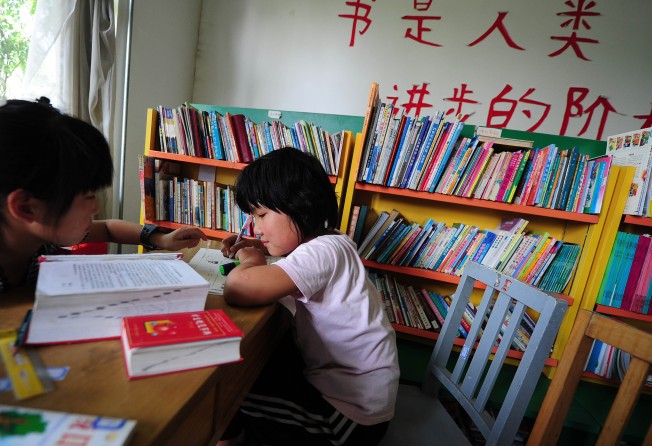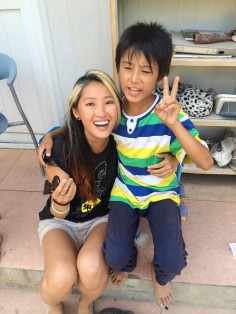Sun Village documentary: How an orphanage built by a Chinese prison officer helps convicts' children

Two decades ago, a Chinese prison supervisor singlehandedly set up a home for convicts' children who fell through the cracks. The orphanage that Shuqin Zhang built - Sun Village - gave the defenceless children shelter, food and education. Today, Sun Village has expanded into nine orphanages across the mainland, housing up to 6,000 children. Two young filmmakers, Zoey Lee and Matt Belbin, have co-directed an hour-long documentary on life in Sun Village. Lee and Belbin spoke to NAOMI NG
What's your documentary about?
Zoey: Our documentary explores the lives of children in Sun Village, how the orphanage functions as a non-profit organisation, a brief history on how it started and a look into what one person can do for society. It features interviews of children who had to go through life paying for their parents' mistakes but who were also lucky enough to come under the care of Shuqin Zhang, the head of Sun Village.
How did you become interested?
Zoey: About five years ago, while living in China, I volunteered for two months at Sun Village. Before that, I had never thought about what would happen to children whose parents go to jail. I felt it was something people need to learn about. We were all very inspired by Zhang and how she started doing this.
Matt: We saw how much Zhang had sacrificed for these kids who don't usually cross people's minds. It was really inspiring and is definitely a story people should hear about - not just the place but also Zhang herself.

Z: We met in the summer and it's usually quite different from normal days when they have to go to school. The kids wake at 5am every day and go to work in the farm or help out with whatever needs doing, ranging from selling fruit to rebuilding parts of the orphanage. They have free time after dinner to watch television or to hang out and play. That was their daily summer routine.
M: Pretty much the entire routine is aimed at gearing them towards what life will be like once they leave the village. They make money from working in the farms and learn basic farming skills. Zhang is serious about these kids learning how to save and spend their money.
Did the children speak about what crimes their parents committed?
Z: We didn't just throw this question out to many kids, we were very careful about who we asked. We brought it up only if we knew the child was comfortable with us. Some kids would be cheeky and say things like, "he killed many, many people" to try to scare you because they get a little annoyed. It was either very extreme rude responses or extreme silence - like they'd look at you and then walk away.
M: But this was mostly only to those visitors and donors who hadn't even really met them. They just kind of came in to take a photo and asked them that.
Z: In the film, some do talk about what their parents did. You'll have to watch to find out!
How was it like when the children were reunited with their parents?
Z: When I was volunteering, I went to one of the prisons. It was very sweet, actually. The parents would ask simple everyday questions. They don't really say, "I love you, I miss you". They'd say, "have you eaten, have you done your homework". In their culture, it's them telling their kids that they love them and want to be sure they're being taken care of. The kids were allowed to bring presents for their parents with the allowances they had earned. They bought a tonne of food, toilet paper and things their parents didn't even need. What was funny for me was that the parents actually also bought their kids the exact same things.
Were there difficulties filming?
Z: The only stressful part was making sure the crew understood how to behave because of cultural differences. Sometimes there were things that were more sensitive. We made sure the kids were completely comfortable because we were invading their home.
M: The only difficulty was that I and our cameraman, Alex, who's British, don't know the language. It was a bit more difficult for the kids to warm up to us because we were foreign and it was bizarre to the kids. But later after we ate with them every day and went on trips together, they got to know us better. The village was very open to us being there, and they gave us everything we needed.
How did Zhang inspire you?
Z: We thought Zhang was only someone who wanted to help kids, but it's also because she wanted to affect change in Chinese society. While she was a prison officer, she met many prisoners who were in pain or suffering because they didn't know where their kids were. When they found out their kids were being taken care of, that made them want to turn over a new leaf faster and get back into society sooner, Zhang said.
M: It was nice to see pure drive from Zhang who set up the orphanage for so many reasons of compassion and commitment. Through all this, she never regretted it. She knows how busy she is and how much this village depends on her, but she doesn't do it just for that. She really cares about the society, the prisoners, and wants to be an example to them as well. I think that's one of the most inspiring things.
The short version of your film has won three awards. What's next?
Z: Our full length documentary is almost completed. We hope to have our opening premiere in Berlin ideally at the end of this month, and then we plan to hit the film festival circuit.
